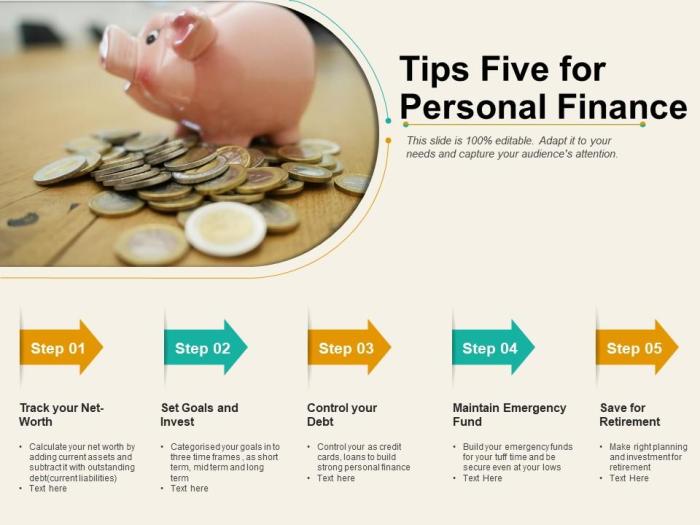Personal Finance Tips take the spotlight, offering insights that will help you navigate the world of money management with finesse and style. From budgeting to investing, get ready to level up your financial game!
Importance of Personal Finance: Personal Finance Tips

Personal finance is crucial for individuals as it involves managing money effectively to achieve financial goals and secure a stable future. By developing good financial habits and making informed decisions, individuals can experience a range of benefits that positively impact their overall well-being.
Benefits of Managing Personal Finances Effectively, Personal Finance Tips
- Building Wealth: Proper management of personal finances can help individuals save and invest wisely, leading to the accumulation of wealth over time.
- Financial Security: By creating a budget, saving for emergencies, and avoiding debt, individuals can establish a safety net for unexpected expenses and financial hardships.
- Reducing Stress: Having control over finances and knowing where money is going can reduce anxiety and stress related to money management.
- Opportunities for Growth: Effective financial planning opens up opportunities for individuals to pursue their goals and dreams, whether it be buying a home, starting a business, or traveling the world.
Budgeting Tips

Budgeting is a crucial aspect of personal finance that helps you manage your money effectively. By creating a budget, you can track your expenses, prioritize your spending, and work towards your financial goals. Here are some strategies for creating a personal budget and the importance of tracking expenses:
Creating a Personal Budget
- List all sources of income: Include your salary, side hustle earnings, and any other income streams.
- Identify fixed expenses: Such as rent, utilities, and loan payments.
- Track variable expenses: Like groceries, dining out, and entertainment.
- Set financial goals: Determine how much you want to save or invest each month.
Importance of Tracking Expenses
Tracking expenses is essential to understand where your money is going and identify areas where you can cut back or reallocate funds. It helps you stay within your budget and avoid overspending.
Tools for Budget Planning
- Mint: A popular app that tracks your spending, categorizes expenses, and creates a budget based on your financial goals.
- You Need A Budget (YNAB): Focuses on giving every dollar a job, helps you plan for upcoming expenses, and provides real-time insights into your finances.
- Personal Capital: Offers tools for budgeting, investment tracking, and retirement planning, all in one platform.
Saving and Investing
Saving and investing are both essential components of personal finance, but they serve different purposes. Saving involves setting money aside for short-term goals or emergencies, usually in a low-risk account like a savings account. On the other hand, investing is about putting your money into assets like stocks, bonds, or real estate with the goal of earning a return over the long term.
Tips for Effective Saving
When it comes to saving money effectively, consider following these tips:
- Set a budget and track your expenses to identify areas where you can cut back.
- Avoid impulse purchases and stick to a shopping list to prevent unnecessary spending.
- Automate your savings by setting up regular transfers to a savings account.
- Take advantage of discounts, coupons, and cashback offers to save on everyday expenses.
- Consider setting specific savings goals to stay motivated and focused on building your savings.
Investment Options for Beginners
For beginners looking to start investing, here are some suitable options to consider:
- Stock Market: Investing in individual stocks or exchange-traded funds (ETFs) can provide growth potential over time.
- Bonds: Government or corporate bonds offer a fixed income stream and are generally considered less risky than stocks.
- Mutual Funds: These pooled investments offer diversification and are managed by professional fund managers.
- Real Estate: Investing in rental properties or real estate investment trusts (REITs) can provide passive income and potential appreciation.
- Robo-Advisors: Automated investment platforms can help beginners build a diversified portfolio based on their risk tolerance and goals.
Debt Management
Debt management is a crucial aspect of personal finance that can greatly impact your financial health. High-interest debt, in particular, can be a major burden and hinder your ability to achieve financial goals. Here are some strategies and tips to help you effectively manage and pay off your debt:
Paying off Debt Strategically
- Create a budget: Start by assessing your income and expenses to determine how much you can allocate towards debt repayment each month.
- Snowball method: Focus on paying off the smallest debt first while making minimum payments on other debts. Once the smallest debt is paid off, move on to the next smallest debt.
- Avalanche method: Prioritize debts with the highest interest rates to minimize the amount of interest paid over time.
- Consider debt consolidation: Consolidating multiple debts into a single loan with a lower interest rate can make repayment more manageable.
Impact of High-Interest Debt
- High-interest debt can accumulate quickly and make it challenging to make progress on paying off the principal balance.
- It can lead to a cycle of debt where a significant portion of your payments goes towards interest rather than reducing the overall debt amount.
- High-interest debt can damage your credit score and limit your ability to access favorable financial products in the future.
Negotiating with Creditors
- Contact your creditors: Reach out to your creditors to discuss your situation and explore options for repayment, such as a lower interest rate or a payment plan.
- Be honest and transparent: Share your financial circumstances openly with creditors to demonstrate your commitment to resolving the debt.
- Consider seeking professional help: If negotiating with creditors becomes overwhelming, consider working with a credit counseling agency or debt settlement company.
Emergency Funds
Having an emergency fund is crucial for financial stability and peace of mind. It acts as a safety net during unexpected situations like medical emergencies, job loss, or major car repairs.
Importance of Having an Emergency Fund
An emergency fund provides a financial cushion to cover expenses in times of crisis without relying on credit cards or loans. It helps prevent debt accumulation and allows you to maintain your standard of living during tough times.
Guidelines on How Much to Save for Emergencies
- Financial experts recommend saving at least 3 to 6 months’ worth of living expenses in your emergency fund.
- If you have dependents or work in a volatile industry, consider saving up to 9 months’ worth of expenses.
- Calculate your monthly expenses and multiply that by the recommended number of months to determine your target emergency fund amount.
Best Practices for Building an Emergency Fund
- Set specific savings goals and prioritize building your emergency fund as a top financial goal.
- Automate your savings by setting up automatic transfers from your checking account to a separate savings account dedicated to emergencies.
- Reduce unnecessary expenses and allocate any windfalls or bonuses towards your emergency fund.
- Regularly review and adjust your emergency fund target based on changes in your income, expenses, or life circumstances.